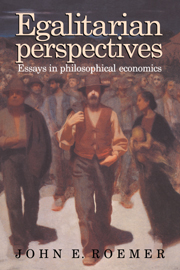Book contents
- Frontmatter
- Contents
- Acknowledgments
- List of sources
- Introduction
- Part I Exploitation
- Part II Equality of resources
- Part III Bargaining theory and justice
- Introduction to Part III
- 9 The mismarriage of bargaining theory and distributive justice
- 10 A challenge to Neo-Lockeanism
- 11 Informational complexity in axiomatic models: benefits and costs
- 12 Distributing health: the allocation of resources by an international agency
- Part IV Public ownership and socialism
- References
- Index
Introduction to Part III
Published online by Cambridge University Press: 23 December 2009
- Frontmatter
- Contents
- Acknowledgments
- List of sources
- Introduction
- Part I Exploitation
- Part II Equality of resources
- Part III Bargaining theory and justice
- Introduction to Part III
- 9 The mismarriage of bargaining theory and distributive justice
- 10 A challenge to Neo-Lockeanism
- 11 Informational complexity in axiomatic models: benefits and costs
- 12 Distributing health: the allocation of resources by an international agency
- Part IV Public ownership and socialism
- References
- Index
Summary
At first thought, it might seem that one should study questions of distributive justice by thinking about different ways one might allocate resources in a given, fixed world. But in Essay 6 another idea was proposed: to study the set of possible allocation mechanisms on a large domain of possible worlds, and to formalize one's views concerning justice as axioms on the behavior of such allocation mechanisms. Essay 7 implemented this methodological approach, and characterized the welfare egalitarian resource allocation mechanism with a set of five axioms.
This approach – of studying the class of allocation rules on a large domain of possible worlds – began in economics in the early 1950s with axiomatic bargaining theory, as developed by Nash (1950), and social choice theory, as developed by Arrow (1951). More recently, Thomson and Lensberg (1989) have applied these techniques to the study of egalitarianism. As developed by these authors, these theories assume an axiom of welfarism, namely, that the only information that is relevant about a possible world is the set of utility possibilities that it generates for its inhabitants. Sen (1979b) coined the term ‘welfarism’ and argued that it is an unacceptable postulate in ethics. The essays in this part argue a different point from Sen's: that welfarism is a methodologically unacceptable premise in studying distributive justice because it forecloses the possibility of modeling property rights, which are of the essence in many discussions of distribution.
Information
- Type
- Chapter
- Information
- Egalitarian PerspectivesEssays in Philosophical Economics, pp. 199 - 201Publisher: Cambridge University PressPrint publication year: 1994
